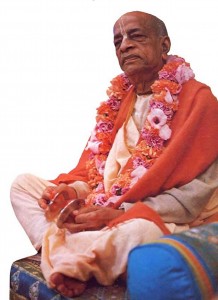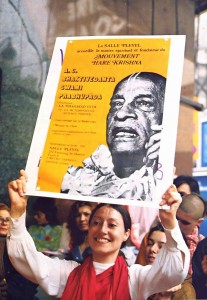A discourse on the Holy Bible by His Divine Grace A.C. Bhaktivedanta Swami Prabhupada Founder-Acarya of the International Society for Krishna Consciousness Delivered on June 14, 1974, in Paris, France
Ladies and gentlemen, I thank you very much for kindly participating in this sankirtana movement, which is a movement for the vibration of transcendental sound. Sound is the origin of all creation. That is admitted in the Bible also. We are reading a passage from the Bible:
[A disciple reads] The Gospel According to Saint John. Chapter 1. “In the beginning was the Word, and the Word was with God, and the Word was God. The same was in the beginning with God. All things were made by him; and without him was not anything made that was made. In him was life; and the life was the light of men. And the light shineth in darkness; and the darkness comprehended it not.”
 This same principle is explained in the Vedic literature. Here it is said, “In the beginning was the Word, and the Word was with God, and the Word was God.” Because God is the Absolute Truth, there is no difference between God and God’s form, His qualities and His word. Everything related to God is also God. In the material world, name and substance are different. For example, when you are thirsty, if you simply utter the words “water, water, water,” that will not quench your thirst. But in the spiritual world the name of God, or Krishna, and the Supreme Personality of Godhead are the same.
This same principle is explained in the Vedic literature. Here it is said, “In the beginning was the Word, and the Word was with God, and the Word was God.” Because God is the Absolute Truth, there is no difference between God and God’s form, His qualities and His word. Everything related to God is also God. In the material world, name and substance are different. For example, when you are thirsty, if you simply utter the words “water, water, water,” that will not quench your thirst. But in the spiritual world the name of God, or Krishna, and the Supreme Personality of Godhead are the same.
I shall quote one Sanskrit verse from the Vedas, which parallels this Biblical passage:
nama cintamanih Krishnas
caitanya-rasa-vigrahah
purnah suddho nitya-mukto
‘bhinnatvan nama-naminoh
The purport of this verse is that the name of God is as powerful as God Himself. It is called purna, which means “complete,” suddha, which means “free from all material contamination,” and nitya, which means “eternal.” Abhinnatvan nama-naminoh means that there is no difference between the name and the person whose name we are chanting. Thus when we chant the holy name of God, like the name Krishna, Krishna is personally present. One need not chant the name Krishna; one may chant any name that he knows is God’s. God has many names, which may be chanted with the same effect in different languages and in different countries.
The Father of Everyone
Actually God has no name, but names are given to Him according to His activities. For example, we are chanting God’s name “Krishna” because “Krishna” means “all-attractive.” How is God all-attractive? We can get some idea from our conception of attractiveness in this material world. One is attractive in this material world if he is very rich, very powerful, very wise, beautiful, famous or renounced. Thus one may become attractive in six ways. The Vedic literature states:
aisvaryasya samagrasya
viryasya yasasah sriyah
jnana-vairagyayos caiva
sannam bhaga itingana
This verse indicates that God is all-attractive because He is the richest of all, He is the strongest, the most beautiful, the most wise, the most renounced and the most famous.
Our position—we human beings who are sitting in this hall, as well as all other living beings—is that we are all sons of God. Krishna states in Bhagavad-gita:
sarva-yonisu kaunteya
murtayah sambhavanti yah
tasam brahma mahad yonir
aham bija-pradah pita
“It should be understood that all the species of life, O son of Kunti, are made possible by birth in this material nature, and that I am the seed-giving father.” [Bg. 14.4] Thus according to the Vedic conception, all living entities in all forms of life are parts and parcels of God. Your Bible says that in the beginning there was only the Word and that the Word was God. Therefore, God existed before the creation. And where did all the created creatures come from? They came from God. Thus all of the 8,400,000 species of creatures were made by God.

He who creates must be the father, for even in the material sense, it is the father who creates his children. How can we deny that this is so? Here in the Bible it is said that all things were created by Him. One cannot whimsically deny the authoritative statements of the Vedas or the Bible. Therefore, He is the father of everything. When you go to the church, you pray, “Father, give us our daily bread.” This indicates that He is the father of everyone. Therefore here it is clearly said, “All things were made by him; and without him was not anything made that was made.” This is perfect knowledge.
In the Image of God
The same ideas are also stated in the Vedanta-sutra, the most perfect philosophy presented in the Vedic language. The Vedanta-sutra says, athato brahma-jijnasa:“Human life is meant for inquiring about God.” This Krishna consciousness movement, therefore, is meant to enable one to understand God. This movement has been active in the Western countries only for the last six or seven years, but it has been on this planet for the last five thousand years. When I say “Krishna consciousness,” this means God consciousness. Human life is meant for understanding God and becoming God conscious. An animal cannot possibly understand God. Our advertisements have invited everyone to this meeting to discuss something about God, but only human beings have come, not cats and dogs. The human life is a chance given by nature with which to understand God, but if one does not fulfill this opportunity, his next life may not be that of a human being. The soul is within the body, and it is a part and parcel of God. If you can understand the soul, therefore, you can partially understand God. Indeed, if you study yourself, to some extent you study God because you are a sample of God. In the Bible it is also said that man is made in the image of God. Therefore if you study yourself—that study is called meditation—then you can understand God.
For those who are in the bodily concept of life, the yoga system and meditation are very important for self-realization. In fact, however, if you want to understand yourself, you can do it very easily by a very simple method. Just consider your finger and ask yourself whether you are your finger. The answer will be no. I am not the finger; it is my finger. Everyone, even a child, will say, “This is my finger, this is my hand, this is my leg, my head.” No one will say, “I finger, I head, I leg.” Therefore the conclusion should be that I, the soul, am different from this material body.
The material body changes because of the presence of the soul. For example, a child changes his body and gets a different body—that of a young boy. Then the boy changes his body and gets a different body—that of a young man, who in turn gets the body of an old man. Every one of us can consider himself in this way: “I had the small body of a child, I had the body of a small boy, I had a youthful body, and now I have an old body.” By this simple study I can understand that I am different from the body. And I can also understand that because I am eternal, I was existing within all these bodily forms. Therefore in Bhagavad-gita it is said, na hanyate hanyamane sarire: after the destruction of this body, I, the soul, am not destroyed but continue to live.” As described in Bhagavad-gita, the soul is eternal.
na jayate mriyate va kadacin
nayam bhutva bhavita va na bhuyah
ajo nityah sasvato ‘yam purano
na hanyate hanyamane sarire
“For the soul there is never birth nor death. Nor, having once been, does he ever cease to be. He is unborn, eternal, ever-existing, undying and primeval. He is not slain when the body is slain.” [Bg. 2.20]
Life After Death
Death is but the destruction of this outer, gross material body. We all have experience that although every night our body lies in bed, with my subtle body, which consists of mind, intelligence and ego, by dreaming I leave my bedroom and go elsewhere. Thus we all have experience of leaving our gross bodies and taking our subtle bodies to do something else while the gross bodies are still here. Therefore, I, the soul, am changing back and forth between gross and subtle bodies. I dream with the subtle body, and when the dream is over I return to the gross body. And the change that takes place when the subtle body carries the soul from one gross body to another is called death.

The subtle body of mind, intelligence and false ego carries one to another body according to the nature of his mind. The mind is always full of thoughts, and at the time of death, according to those thoughts in which his mind is absorbed, the soul is given another gross body. This is explained in Bhagavad-gita:
yam yam vapi smaran bhavam
tyajaty ante kalevaram
tam tam evaiti kaunteya
sada tad-bhava-bhavitah
“Whatever state of being one remembers when he quits his body, that state he will attain without fail.” [Bg. 8.6] Thus bhava, the attitudes of the mind, carry one to the next gross body at the time of death.
Bhagavad-gita says that after death the soul gets another body (tatha dehantara-praptih). What kind of body will one get? It is necessary to prepare oneself. Now, we can see that there are so many kinds of bodies. In the water there are 900,000 species, in the vegetable kingdom, among the trees and plants, there are 2,000,000 kinds of bodies, and there are also 11,000 species of insects, 1,000,000 types of birds and 3,000,000 types of beastly bodies.
There are 400,000 human species, and the civilized man is considered to be in the perfect bodily situation because nature gives us this human form of body to enable us to understand God. In other forms of life, there is no chance of understanding Him. Therefore, the duty of each of us, before our next death comes, is to understand God. If we simply misuse this body to live like cats and dogs, we are missing our greatest chance.
Because we are completely under the control of material nature, we cannot possibly say that we are free. That is stated in Bhagavad-gita:
prakrteh kriyamanani
gunaih karmani sarvasah
ahankara-vimudhatma
kartaham iti manyate
“The bewildered spirit soul, under the influence of the three modes of material nature, thinks himself the doer of activities that are in actuality carried out by nature.” [Bg. 3.27] There are three modes of material nature, namely goodness, passion and ignorance. When we are under the control of material nature, we associate with these modes, or qualities. As stated in Bhagavad-gita:
urdhvam gacchanti sattva-stha
madhye tisthanti rajasah
jaghanya-guna-vrtti-stha
adho gacchanti tamasah
“Those who associate with the mode of goodness are promoted to the higher planetary systems, those in the mode of passion remain in the middle planetary systems, and those in the mode of ignorance descend to the lower planetary systems.” [Bg. 14.18] Therefore, although we may like to think that we are independent, these three modes of nature have been carrying us from one planet to another and from one body to another since time immemorial. We are all eternal, but because our consciousness has been polluted by these three qualities of nature, we have to undergo repeated birth and death in the material world. Therefore, we should take advantage of the opportunity afforded by the human form of life to become free from these material qualities and rise to the spiritual platform of God consciousness, or Krishna consciousness.

Getting in Touch with God
“In the beginning was the Word.” This indicates that before creation, transcendental sound existed. That word or transcendental sound is not like material sound, for if we associate with the transcendental sound Hare Krishna, we become purified and thus become transcendental. To give a crude example, if we put an iron rod into a fire, it will gradually become warmer and warmer until it becomes red hot. When it is red hot, it will no longer be iron; it will be fire. How has it become fire? By association with the fire. Therefore if you simply keep yourself in touch with God through the transcendental sound, gradually you will become godly, and as soon as you become godly, you will become the same in quality as God—full in riches, full in power, full in knowledge and everything else. Therefore the Vedic instruction is, “Don’t keep yourself in darkness. Come to the light.” At the present moment, the entire world, for want of godly understanding, is in darkness. But since we have the privilege of eating, sleeping, sexual intercourse and defense. Cats and dogs also eat, sleep, have sex and defend, but a human being should not be educated only in these four principles of animal necessities. The real need of humanity is the need to understand God. Therefore in every civilized human society there is some system of religion. Whether it is Christianity, Mohammedanism, Hinduism or whatever, in civilized society there must be some form of religion, and a human being is supposed to follow the religious principles to have complete knowledge of God and himself, to know the relationship between God and himself, and to know the goal of life. It doesn the real purpose of life is to know God, or religion, consists of the codes given by God.
Therefore, in conclusion, there is God, and God’s word indicates that God is a person. As soon as we accept the word of God, we have to conclude that God is a person. You are vibrating words and I am vibrating words, and this shows that we are persons. The word of God and God Himself are not different, yet God is a person, and He speaks. If He can speak, then He can also hear, smell, eat and perform all other sensual activities. If He could not hear, then our prayers to Him—”O God, please give us our daily bread”—would be useless. Therefore from the statements of the scriptures—whether the Bible or Bhagavad-gita—it is understood that God is a person like you.
As stated in the Vedas, nityo nityanam cetanas cetananam/ eko bahunam yo vidadhati kaman. This verse indicates that God is the Supreme Being. Even in the dictionary it is stated that “God” refers to the Supreme Being. We are all beings, but God is the supreme being. Just as in every state there are citizens but there is one chief citizen or chief executive, so among the many living beings there is one supreme living being. Just as we are living beings, God is also a living being, and just as we eternal, God is also eternal. But God is one, whereas we are many. And what is significant about that one? Eko bahunam yo vidadhati kaman: that one—God—is maintaining all the other living beings. He is a person and we are persons, but because He is the one who maintains us, we therefore go to God to beg for our daily bread. By constitutional position, therefore, we are predominated, and God is the predominator; we are very small, and God is very great.
At the present moment, however, we are defying this position, and that is why we are in trouble. Our Krishna consciousness movement, therefore, is educating people to understand that since they are always subordinate to Krishna, if they surrender to Krishna they will be happy. Do not remain in a rebellious condition of life. Just surrender to God and you will be happy. That is the final conclusion of Bhagavad-gita (sarva-dharman parityajya mam ekam saranam vraja). We are making so many plans to become happy and they are failing, but if we take this plan, if we surrender to God, then all our problems will be solved. Our Krishna consciousness movement does not try to make Hindus into Christian or Christian into Hindus. That is not our purpose. Or only request to you is this: every one of you, try to understand God, love Him and be happy.
The final conclusion of Bhagavad-gita is that if you want your mind to be peaceful, you should understand three things: that God is the supreme enjoyer, that His is the proprietor of everything, and that His is the friend of everyone. If you very scientifically understand only these three things, then you life will successful.
You can understand these simple truth by chanting God’s name: Hare Krishna, Hare Krishna, Krishna Krishna, Hare Hare/ Hare Rama, Hare Rama, Rama Rama, Hare Hare. Hare is an address to the energy of God, Krishna meand God, who is all-attractive, and Rama is also a name of God. So in this verse—Hare Krishna, Hare Krishna, Krishna Krishna Hare Hare/ Hare Rama, Hare Rama, Rama Rama, Hare Hare-there are only three words: Hare, Krishna and Rama. Therefore anyone can chant these three names-Hare, Krishna and Rama—and make his life perfect. I hope that you will join us in chanting this Hare Krishna maha-mantra.


Leave a Reply